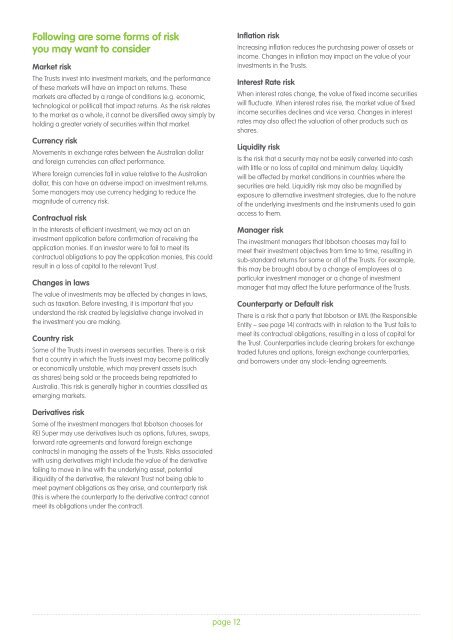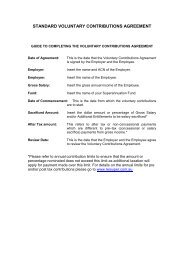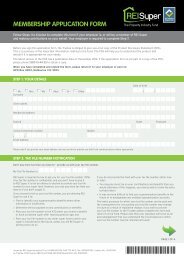Member Information Booklet - REI Super
Member Information Booklet - REI Super
Member Information Booklet - REI Super
Create successful ePaper yourself
Turn your PDF publications into a flip-book with our unique Google optimized e-Paper software.
following are some forms of risk<br />
you may want to consider<br />
market risk<br />
The Trusts invest into investment markets, and the performance<br />
of these markets will have an impact on returns. These<br />
markets are affected by a range of conditions (e.g. economic,<br />
technological or political) that impact returns. As the risk relates<br />
to the market as a whole, it cannot be diversified away simply by<br />
holding a greater variety of securities within that market.<br />
Currency risk<br />
Movements in exchange rates between the Australian dollar<br />
and foreign currencies can affect performance.<br />
Where foreign currencies fall in value relative to the Australian<br />
dollar, this can have an adverse impact on investment returns.<br />
Some managers may use currency hedging to reduce the<br />
magnitude of currency risk.<br />
Contractual risk<br />
In the interests of efficient investment, we may act on an<br />
investment application before confirmation of receiving the<br />
application monies. If an investor were to fail to meet its<br />
contractual obligations to pay the application monies, this could<br />
result in a loss of capital to the relevant Trust.<br />
Changes in laws<br />
The value of investments may be affected by changes in laws,<br />
such as taxation. Before investing, it is important that you<br />
understand the risk created by legislative change involved in<br />
the investment you are making.<br />
Country risk<br />
Some of the Trusts invest in overseas securities. There is a risk<br />
that a country in which the Trusts invest may become politically<br />
or economically unstable, which may prevent assets (such<br />
as shares) being sold or the proceeds being repatriated to<br />
Australia. This risk is generally higher in countries classified as<br />
emerging markets.<br />
derivatives risk<br />
Some of the investment managers that Ibbotson chooses for<br />
<strong>REI</strong> <strong>Super</strong> may use derivatives (such as options, futures, swaps,<br />
forward rate agreements and forward foreign exchange<br />
contracts) in managing the assets of the Trusts. Risks associated<br />
with using derivatives might include the value of the derivative<br />
failing to move in line with the underlying asset, potential<br />
illiquidity of the derivative, the relevant Trust not being able to<br />
meet payment obligations as they arise, and counterparty risk<br />
(this is where the counterparty to the derivative contract cannot<br />
meet its obligations under the contract).<br />
page 12<br />
inflation risk<br />
Increasing inflation reduces the purchasing power of assets or<br />
income. Changes in inflation may impact on the value of your<br />
investments in the Trusts.<br />
interest rate risk<br />
When interest rates change, the value of fixed income securities<br />
will fluctuate. When interest rates rise, the market value of fixed<br />
income securities declines and vice versa. Changes in interest<br />
rates may also affect the valuation of other products such as<br />
shares.<br />
Liquidity risk<br />
Is the risk that a security may not be easily converted into cash<br />
with little or no loss of capital and minimum delay. Liquidity<br />
will be affected by market conditions in countries where the<br />
securities are held. Liquidity risk may also be magnified by<br />
exposure to alternative investment strategies, due to the nature<br />
of the underlying investments and the instruments used to gain<br />
access to them.<br />
manager risk<br />
The investment managers that Ibbotson chooses may fail to<br />
meet their investment objectives from time to time, resulting in<br />
sub-standard returns for some or all of the Trusts. For example,<br />
this may be brought about by a change of employees at a<br />
particular investment manager or a change of investment<br />
manager that may affect the future performance of the Trusts.<br />
Counterparty or default risk<br />
There is a risk that a party that Ibbotson or IIML (the Responsible<br />
Entity – see page 14) contracts with in relation to the Trust fails to<br />
meet its contractual obligations, resulting in a loss of capital for<br />
the Trust. Counterparties include clearing brokers for exchange<br />
traded futures and options, foreign exchange counterparties,<br />
and borrowers under any stock-lending agreements.





